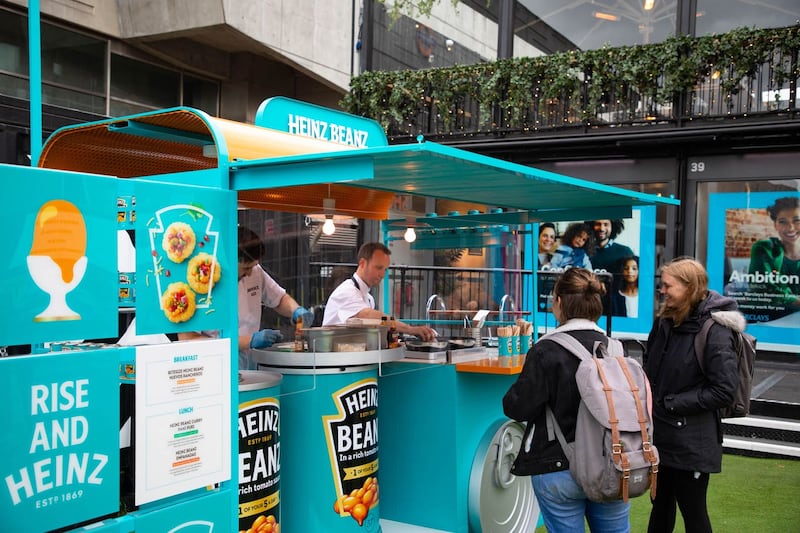Makers of branded baked beans and mayonnaise have increased the profitability of their products during the cost-of-living crisis, according to a review by the competition watchdog.
The Competition and Markets Authority said three in four companies that supply branded beans, mayo, infant formula and pet food have raised prices faster than the cost increases they have shouldered.
It also warned that, as costs start coming down, some companies do not plan to cut their prices, instead passing on the savings through promotions.
We’ve published our Autumn update in the ongoing review of #competition in the food and #groceries sector.https://t.co/2GeHq5PqAM
Thread on our latest findings and next steps ⬇️#costoflivingcrisis #costofliving #grocery #groceryindustry pic.twitter.com/81PNEE4qHG
— Competition & Markets Authority (@CMAgovUK) November 29, 2023
As supermarkets Tesco and Sainsbury’s now only offer most of their discounts to loyalty scheme members, this could risk creating a two-tier system, the CMA said.
The watchdog said it will launch a new investigation into the loyalty schemes.
It also announced a probe into the highly concentrated baby formula market, where just two companies account for 85% of sales.
The CMA said on Wednesday that most of the food price inflation in recent years has been driven by the rises in costs that companies have faced.
Everything from energy prices and fertiliser costs to the wages they pay their staff have soared for many food suppliers.
But the watchdog said there is evidence that some branded producers are adding extra profits on top of the price rises caused by their cost increases.
While retailers can negotiate with the suppliers, they can be at a disadvantage.

Products like Heinz baked beans, Hellmann’s mayonnaise and Felix cat food are “must stock” for retailers, the CMA said, and customers might stop going back if they are unavailable.
Despite this, in most cases customers have voted with their feet and switched to cheaper alternatives to the branded products. This has led to an overall decline in these brands’ market shares and their profits.
“This switching is positive for competition and allows those able to switch to lessen the impact of high food price inflation,” the CMA said.
The CMA found that sales of branded beans fell 23%, while own-brand sales jumped 18%. Branded mayonnaise dropped 12% while the unbranded varieties rose 9%.
In several categories that the CMA looked at, including cat food, desserts, lemonade, ready meals and milk, sales of both branded and non-branded items fell.
But the one exception is infant formula, the CMA said.
The picture is different for baby formula, with little evidence that people are switching to cheaper products and limited alternatives.
We’ll be looking into indications that ineffective competition in the #BabyFormula market could be leading to parents paying higher prices. pic.twitter.com/TrspPRX0yj
— Competition & Markets Authority (@CMAgovUK) November 29, 2023
Just two suppliers account for 85% of infant formula sales, it said, and there is “very limited availability” of own-brand alternatives.
Aldi is the only supermarket to offer an own-brand alternative, meaning few parents have switched as prices have risen.
The CMA said infant formula prices have increased 25% over two years.
“We’re concerned that parents may not always have the right information to make informed choices and that suppliers may not have strong incentives to offer infant formula at competitive prices,” said CMA chief executive Sarah Cardell.
The watchdog also said it will look more closely at supermarket loyalty schemes.
In recent years shops like Tesco and Sainsbury’s have launched schemes which give loyalty card holders significant discounts on some items in their weekly shop.
But the review found that promotions might become even more vital to shoppers in the future as many branded manufacturers say they will try to regain lost sales through in-store promotions, rather than by slashing prices permanently.
“Since Tesco and Sainsbury’s now principally use loyalty schemes (Clubcard and Nectar) for such promotional activity, this is likely to lead to a growing prevalence of two-tier prices in these stores,” the CMA said.
“More generally, a rise in promotional activity across large retailers could lead to a more complicated environment for consumers to compare and choose the best deals.”
Ms Cardell added: “Food price inflation has put huge strain on household budgets, so it is vital competition issues aren’t adding to the problem.
“While in most cases the leading brands have raised prices more than their own cost increases, own-label products are generally providing cheaper alternatives.”








